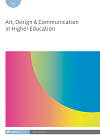- Home
- A-Z Publications
- Art, Design & Communication in Higher Education
- Previous Issues
- Volume 3, Issue 1, 2004
Art, Design & Communication in Higher Education - Volume 3, Issue 1, 2004
Volume 3, Issue 1, 2004
-
-
Editorial
More LessBy Linda DrewThis particular issue should interest readers from a number of different perspectives, because there is a wide range of featured subject contexts including art, design and media practice, media studies and specialist areas such as journalism and publishing education. However, the focus of the five major articles in this issue concentrates on just two key aspects of learning and teaching: learner reflection and assessment.
-
-
-
A reflective approach to teaching journalism
More LessThis article considers how professionals ‘think by doing’ and provides a theoretical rationale for reflective practice as a model for teaching journalism. This approach focuses on the development of graduate efficacy in the intellectual skills and the understanding required of professional practitioners. It is argued here that by ‘blocking the exits’ to escape from the implications and effects of their practice, students are held to high benchmarks of critical thinking. Further, the ‘lived’ experience provided by a problem-based pedagogy develops confidence and a sense of competence in students. Moreover, this approach integrates thinking and doing in a way that binds practices with the social and ethical effects produced.
-
-
-
The art of reflection: reflective practice in publishing education
More LessOne of the aims for the MA Publishing at Nottingham Trent University is to ‘develop students into reflective practitioners ...’ Associated with this aim are several assessed learning outcomes. From student feedback throughout the course, it became evident that the various prescribed methods of reflection were not having the expected outcome: that of enabling students to take a deep approach to learning. This paper examines the reasons for this by exploring the students’ perceptions of their experiences and comparing them to a small sample of other postgraduate students’ experiences of reflection. This is achieved using both qualitative and quantitative data collection methods. The focus is on the journal as this was the method that students concentrated upon in their responses. It was found that those on the non-practice-based MA Publishing experienced difficulties, both in their usefulness and assessment; in contrast those on practice-based programmes considered the journal useful, but timeconsuming. It was concluded, that in addition to the journal, other methods to encourage reflection should be investigated for those students on non-practicebased programmes; and that they should be embedded into the curriculum.
-
-
-
Reflection as confession: discipline and docility in/on the student body
More LessBy Angela DevasThis article examines the reflective turn in student education. It draws on Foucault (1977, 1979, 1980) to analyse a student response questionnaire using a methodology derived from textual analysis. The articles investigates the idea of self-governance and situates the student within a regime of self-examination and self-surveillance. This is linked to a notion of power that operates from within the student, rather than from above. In the process of becoming a ‘student subject’ the student becomes a self-monitoring agent. The author argues that the imperative of confession is used to situate the student within a particular nexus of power. The article interrogates the idea of the rational subject of the enlightenment that is constructed by the questionnaire, and argues that the ‘student’ is a product of discursive educational practices. The notion of learning that is implied by the questionnaire does not directly address issues of class and cultural capital, but these issues can be unpacked from the questionnaire, which also offers up an idealized, masculinized subject position for the learner.
-
-
-
Supporting and assessing dissertations and practical projects in media studies degrees: towards collaborative learning
More LessAuthors: Ben Calvert and Bernadette CaseyThis article is a reflection on one aspect of a research project on effective dissertation support at undergraduate level. Whilst the research project sought to investigate supervision practices across a range of subject areas, an interesting specific focus emerged in relation to dissertations in media studies, where practice and theoretical work can, and often do, intersect. This investigation discusses a range of issues around the experience of supervising and being supervised, within the context of ongoing debates about the relative position and status of practical and theoretical work in media studies. It suggests that a ‘collaborative learning’ approach to supervision might be a fruitful way forward.
-
-
-
The ‘wow’ factors: the assessment of practical media and creative arts subjects
More LessBy Janey GordonThis article proposes that within media arts and other practical creative subjects, the ‘wow’ factors have a legitimate place within assessment criteria. Three distinctive considerations of assessment procedures within these subject areas are identified and the QAA benchmarks for the creative arts subjects are examined, noting that the music benchmarks are particularly inspiring. Three practices are suggested as ways of encouraging students to ‘live dangerously’ when doing practical assignments. The piece concludes that media arts and other creative subject areas entail a number of skills and qualities that are going to require subtle assessment procedures.
-
Volumes & issues
-
Volume 22 (2023)
-
Volume 21 (2022)
-
Volume 20 (2021)
-
Volume 19 (2020)
-
Volume 18 (2019)
-
Volume 17 (2018)
-
Volume 16 (2017)
-
Volume 15 (2016)
-
Volume 14 (2015)
-
Volume 13 (2014)
-
Volume 12 (2013)
-
Volume 11 (2012)
-
Volume 10 (2012)
-
Volume 9 (2010)
-
Volume 8 (2009)
-
Volume 7 (2008 - 2009)
-
Volume 6 (2007 - 2008)
-
Volume 5 (2006 - 2007)
-
Volume 4 (2005)
-
Volume 3 (2004)
-
Volume 2 (2003 - 2004)
-
Volume 1 (2002 - 2003)
Most Read This Month


